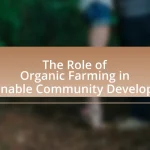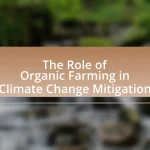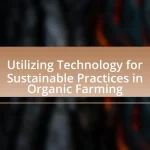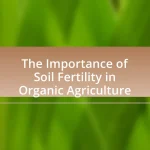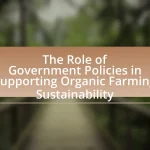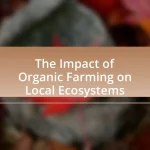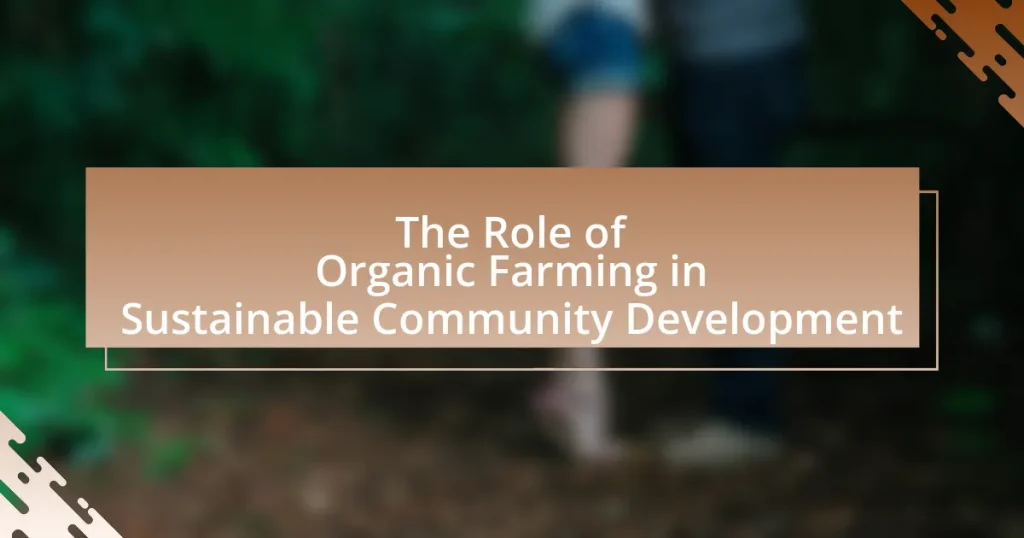Organic farming is a vital component of sustainable community development, promoting environmentally friendly agricultural practices that enhance local economies and food security. This article explores the multifaceted benefits of organic farming, including its role in improving soil health, increasing biodiversity, and creating job opportunities within communities. It highlights key principles such as ecological balance and labor-intensive methods that contribute to economic viability and resilience against climate change. Additionally, the article addresses challenges faced by communities in transitioning to organic practices and outlines strategies for successful implementation, emphasizing the importance of education, cooperative models, and local government support.
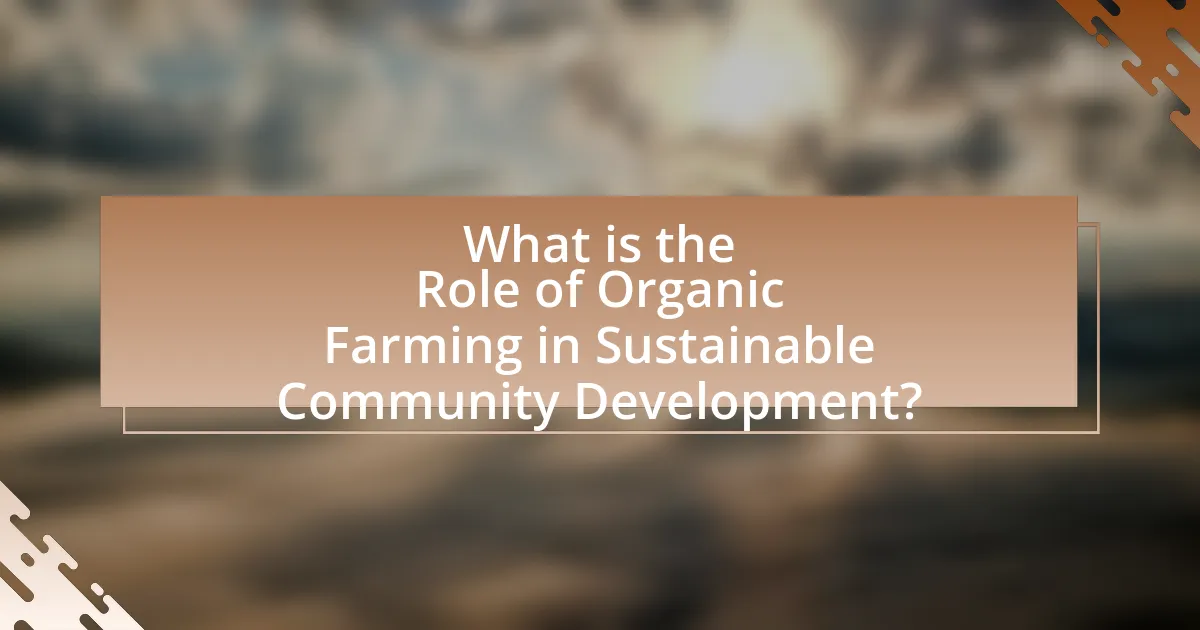
What is the Role of Organic Farming in Sustainable Community Development?
Organic farming plays a crucial role in sustainable community development by promoting environmentally friendly agricultural practices that enhance local economies and improve food security. This farming method reduces reliance on synthetic chemicals, thereby preserving soil health and biodiversity, which are essential for long-term agricultural productivity. Studies indicate that organic farming can increase local employment opportunities, as it often requires more labor-intensive practices compared to conventional farming. Additionally, organic farms typically sell their products directly to consumers, fostering local markets and keeping economic benefits within the community. Research from the Rodale Institute shows that organic farming can yield comparable or even higher outputs over time, supporting the notion that it is a viable alternative for sustainable development.
How does organic farming contribute to community sustainability?
Organic farming contributes to community sustainability by promoting ecological balance, enhancing local economies, and fostering social equity. This agricultural practice reduces reliance on synthetic chemicals, which protects local ecosystems and biodiversity. According to a study published in the journal “Sustainability,” organic farming can increase soil health and water conservation, leading to more resilient agricultural systems. Additionally, organic farms often source materials locally and sell produce directly to consumers, which stimulates local economies and creates jobs. Furthermore, organic farming practices encourage community engagement and education, fostering a sense of social responsibility and collaboration among residents.
What are the key principles of organic farming that support sustainability?
The key principles of organic farming that support sustainability include biodiversity, soil health, and ecological balance. Biodiversity is promoted through crop rotation and polyculture, which enhance resilience against pests and diseases. Soil health is maintained by using organic fertilizers and compost, which improve soil structure and fertility, leading to better water retention and reduced erosion. Ecological balance is achieved by minimizing synthetic inputs and fostering natural pest control methods, which contribute to a healthier ecosystem. These principles collectively ensure that organic farming practices contribute to long-term environmental sustainability and community resilience.
How does organic farming enhance local biodiversity?
Organic farming enhances local biodiversity by promoting a diverse range of plant and animal species through practices that avoid synthetic chemicals and prioritize ecological balance. This farming method encourages the growth of native plants, which in turn supports various pollinators and beneficial insects, leading to a more resilient ecosystem. Research indicates that organic farms typically host 30% more species than conventional farms, as shown in a study published in the journal “Agriculture, Ecosystems & Environment” by authors such as Benis et al. (2019). This increase in biodiversity contributes to improved soil health, pest control, and overall ecosystem stability, reinforcing the importance of organic farming in sustainable community development.
Why is organic farming important for local economies?
Organic farming is important for local economies because it promotes sustainable agricultural practices that enhance local food systems and create jobs. By focusing on organic methods, farmers can reduce reliance on synthetic inputs, which often leads to lower production costs and higher profit margins. According to a study by the Organic Trade Association, organic farming generates approximately 1.5 million jobs in the United States alone, contributing significantly to local employment. Additionally, organic farms often sell directly to consumers through farmers’ markets and community-supported agriculture (CSA) programs, which keeps money circulating within the local economy. This direct-to-consumer model not only supports local farmers but also fosters community engagement and strengthens local food networks.
How does organic farming create job opportunities in communities?
Organic farming creates job opportunities in communities by increasing demand for labor-intensive agricultural practices and supporting local economies. The shift towards organic methods requires more hands-on work, such as planting, weeding, and harvesting, which leads to the creation of jobs for local residents. According to a study by the USDA, organic farms employ 30% more workers per acre compared to conventional farms, highlighting the labor-intensive nature of organic agriculture. Additionally, organic farming often encourages the establishment of local markets, processing facilities, and distribution networks, further generating employment opportunities in various sectors related to agriculture.
What economic benefits does organic farming provide to local farmers?
Organic farming provides local farmers with higher profit margins compared to conventional farming. This is primarily due to the premium prices that organic products command in the market, which can be up to 30% higher than non-organic counterparts. Additionally, organic farming often reduces input costs related to synthetic fertilizers and pesticides, leading to lower overall production costs. According to a study published in the journal “Agricultural Economics,” organic farms in the United States reported an average net income that was 22% higher than conventional farms, demonstrating the economic viability of organic practices. Furthermore, organic farming can enhance local economies by creating jobs in processing, distribution, and retail, thereby contributing to community development.

What are the environmental impacts of organic farming on communities?
Organic farming positively impacts communities by enhancing biodiversity, improving soil health, and reducing pollution. These practices promote a diverse ecosystem, which supports various plant and animal species, leading to increased resilience against pests and diseases. Research indicates that organic farming methods, such as crop rotation and composting, significantly improve soil structure and fertility, resulting in healthier crops and reduced erosion. Additionally, organic farming minimizes the use of synthetic pesticides and fertilizers, which decreases chemical runoff into local waterways, thereby protecting aquatic ecosystems and community health. Studies show that organic farms can increase local biodiversity by up to 30% compared to conventional farms, demonstrating their crucial role in fostering sustainable community development.
How does organic farming reduce pollution and promote soil health?
Organic farming reduces pollution and promotes soil health by eliminating synthetic fertilizers and pesticides, which are major contributors to environmental contamination. Instead, organic practices utilize natural inputs such as compost and crop rotations, which enhance soil structure and fertility. Research indicates that organic farming can reduce nitrogen leaching into waterways by up to 50%, thereby decreasing water pollution. Additionally, organic farming increases biodiversity in soil ecosystems, which is essential for nutrient cycling and soil resilience. Studies show that organic soils have higher organic matter content, improving water retention and reducing erosion, further contributing to overall soil health.
What practices in organic farming help minimize chemical use?
Practices in organic farming that help minimize chemical use include crop rotation, intercropping, and the use of organic fertilizers and pest control methods. Crop rotation disrupts pest and disease cycles, reducing the need for chemical pesticides. Intercropping enhances biodiversity, which can naturally suppress pests and diseases. Organic fertilizers, such as compost and manure, improve soil health without synthetic chemicals, promoting nutrient cycling and reducing dependency on chemical inputs. These practices are supported by research indicating that organic farming can lead to lower chemical usage while maintaining productivity and sustainability.
How does organic farming contribute to water conservation?
Organic farming contributes to water conservation by utilizing practices that enhance soil health and reduce water usage. These practices include crop rotation, cover cropping, and the use of organic fertilizers, which improve soil structure and increase its ability to retain moisture. Research indicates that organic farms can use up to 30% less water than conventional farms due to these improved soil conditions, which allow for better infiltration and retention of rainwater. Additionally, organic farming avoids synthetic pesticides and fertilizers that can contaminate water sources, further promoting clean water availability.
What role does organic farming play in climate change mitigation?
Organic farming plays a significant role in climate change mitigation by enhancing soil health and reducing greenhouse gas emissions. This agricultural practice emphasizes the use of natural inputs and sustainable methods, which can lead to increased carbon sequestration in soils. Research indicates that organic soils can store up to 30% more carbon than conventional soils, thereby helping to lower atmospheric CO2 levels. Additionally, organic farming reduces reliance on synthetic fertilizers and pesticides, which are major contributors to nitrous oxide emissions, a potent greenhouse gas. By promoting biodiversity and improving ecosystem resilience, organic farming contributes to a more sustainable agricultural system that can better withstand climate impacts.
How can organic farming practices reduce greenhouse gas emissions?
Organic farming practices can reduce greenhouse gas emissions by enhancing soil health and promoting biodiversity. These practices, such as crop rotation, cover cropping, and reduced tillage, improve soil organic matter, which increases carbon sequestration. Research indicates that organic soils can store up to 30% more carbon than conventional soils, effectively lowering atmospheric CO2 levels. Additionally, organic farming minimizes the use of synthetic fertilizers, which are significant sources of nitrous oxide emissions, a potent greenhouse gas. By relying on natural fertilizers like compost and manure, organic farming further mitigates these emissions. Studies show that organic farming can reduce overall greenhouse gas emissions by 25% to 50% compared to conventional methods, demonstrating its effectiveness in combating climate change.
What are the long-term benefits of organic farming for climate resilience?
Organic farming enhances climate resilience by improving soil health, increasing biodiversity, and reducing greenhouse gas emissions. Healthy soils, enriched through organic practices, retain moisture better and are more resilient to extreme weather events, such as droughts and floods. Research indicates that organic farming can sequester carbon in the soil, with studies showing that organic soils can store up to 30% more carbon than conventional soils. Additionally, organic farming promotes diverse ecosystems, which can better withstand climate fluctuations and pests, further contributing to agricultural stability. These practices collectively support long-term agricultural sustainability and climate adaptation.
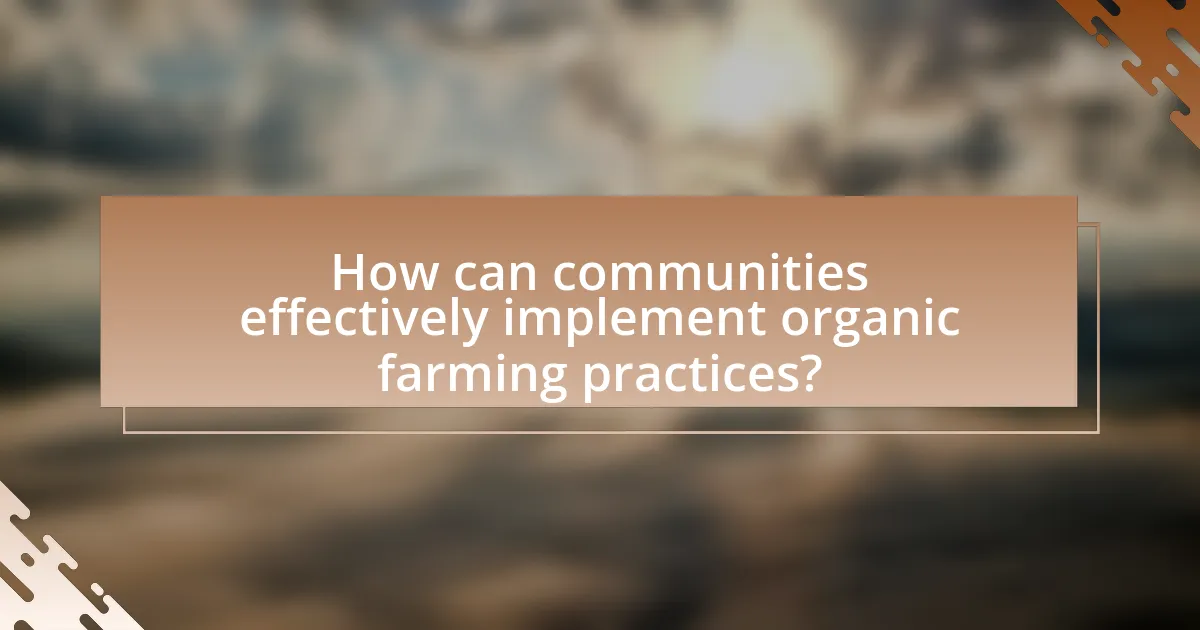
How can communities effectively implement organic farming practices?
Communities can effectively implement organic farming practices by establishing cooperative models that promote shared resources and knowledge. These cooperatives can facilitate access to organic seeds, tools, and training, which are essential for successful organic farming. Research indicates that communities engaged in cooperative farming see a 20-30% increase in crop yields compared to individual efforts, as reported by the Food and Agriculture Organization. Additionally, local governments can support these initiatives by providing grants and subsidies for organic farming projects, thereby enhancing community participation and sustainability.
What strategies can communities adopt to promote organic farming?
Communities can adopt several strategies to promote organic farming, including education and awareness programs, local farmer markets, and community-supported agriculture (CSA) initiatives. Education programs can inform residents about the benefits of organic farming, such as improved health and environmental sustainability, which can increase consumer demand for organic products. Local farmer markets provide a platform for organic farmers to sell their produce directly to consumers, fostering a local economy and encouraging community engagement. CSA initiatives allow consumers to buy shares of a farm’s harvest in advance, providing farmers with upfront capital and consumers with fresh, organic produce. These strategies have been shown to enhance community support for organic farming, as evidenced by the increase in organic farm sales, which reached $11.2 billion in the U.S. in 2020, according to the USDA.
How can education and training enhance organic farming adoption?
Education and training enhance organic farming adoption by equipping farmers with essential knowledge and skills necessary for effective organic practices. These educational programs provide insights into sustainable agricultural techniques, pest management, soil health, and crop rotation, which are critical for successful organic farming. Research indicates that farmers who participate in training programs are more likely to adopt organic methods; for instance, a study published in the Journal of Sustainable Agriculture found that farmers who received training increased their organic crop yields by an average of 30%. This evidence underscores the importance of education and training in facilitating the transition to organic farming, ultimately contributing to sustainable community development.
What role do local governments play in supporting organic farming initiatives?
Local governments play a crucial role in supporting organic farming initiatives by implementing policies, providing funding, and facilitating education and outreach programs. They create regulatory frameworks that promote organic practices, such as zoning laws that allow for urban agriculture and incentives for organic certification. For instance, the USDA reported that local governments can enhance access to resources for organic farmers through grants and technical assistance, which helps increase the number of certified organic farms. Additionally, local governments often collaborate with agricultural extension services to offer workshops and training sessions, thereby increasing awareness and knowledge about organic farming methods among community members.
What challenges do communities face in transitioning to organic farming?
Communities face several challenges in transitioning to organic farming, including financial constraints, lack of knowledge, and market access issues. Financially, the initial investment for organic certification and infrastructure can be prohibitive, as organic farming often requires more labor and resources upfront compared to conventional methods. Additionally, many farmers lack access to training and education on organic practices, which can hinder their ability to implement effective organic farming techniques. Market access is another significant challenge; organic products often require a different marketing strategy and consumer base, which can be difficult for communities to establish. According to a study by the Organic Trade Association, 70% of organic farmers reported challenges related to market access, highlighting the need for improved distribution channels and consumer awareness.
How can communities overcome financial barriers to organic farming?
Communities can overcome financial barriers to organic farming by establishing cooperative models that pool resources and share costs among farmers. This approach allows for collective purchasing of organic seeds, equipment, and supplies, reducing individual financial burdens. For instance, research from the University of California found that cooperatives can lower input costs by up to 30%, making organic farming more accessible. Additionally, communities can seek grants and funding from government programs and non-profit organizations dedicated to sustainable agriculture, which can provide essential financial support for transitioning to organic practices.
What are common misconceptions about organic farming that need addressing?
Common misconceptions about organic farming include the belief that it is significantly less productive than conventional farming, that it is always more expensive, and that organic produce is free from pesticides. Research indicates that organic farming can yield comparable results to conventional methods, especially when employing advanced techniques like crop rotation and polyculture. Additionally, while organic products may have a higher retail price, this often reflects the costs associated with sustainable practices rather than inherent inefficiency. Lastly, organic farming does use pesticides, but they are typically derived from natural sources and are subject to strict regulations, ensuring they are safer for both consumers and the environment.
What best practices can communities follow for successful organic farming?
Communities can achieve successful organic farming by implementing practices such as crop rotation, composting, and integrated pest management. Crop rotation enhances soil fertility and reduces pest buildup, as evidenced by studies showing that rotating crops can increase yields by up to 20%. Composting enriches soil with nutrients and improves moisture retention, which is crucial for plant health. Integrated pest management minimizes chemical use by combining biological control, habitat manipulation, and resistant crop varieties, leading to healthier ecosystems and reduced environmental impact. These practices collectively contribute to sustainable agricultural systems, fostering community resilience and food security.

